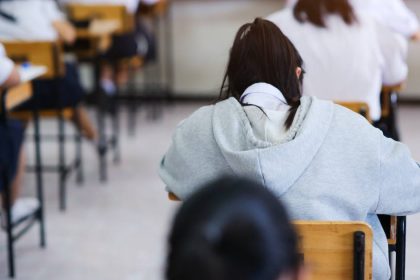Not everybody begins school from the same starting line.
The Mirabel Foundation’s Program Manager Tina Anderson tells the story of a young girl who had grown up in Queensland, with her single-parent mother lost in a daily hunt for drugs and oblivious to the needs of her daughter.
“This girl would be left for periods of time by herself, or there would be strange people in the house,” Ms Anderson says.
“She finally arrived at her nan’s house, in New South Wales, and she was a broken little girl. She had missed chunks of school, so she was way behind academically on top of everything else she was going through.”
This is not an uncommon story for The Mirabel Foundation, which has spent a quarter of a century providing emotional support and tangible assistance for kids orphaned or abandoned by parental drug use, and for the ‘kinship carers’ from their extended family who have taken them in.
Another child Ms Anderson recalls is a young First Nations boy who had endured a childhood of drugs ravaging his parents’ lives. His appearance at school had been occasional and when he was professionally assessed in Year four, he was found to have the academic level of a pre-schooler.
“Kids we work with have often missed a lot of schooling, early education, the fundamental stuff because of the dysfunction that was going on at home, depending on the age of their removal,” Ms Anderson says.
“Some kids rock up to school and they’ve got an empty lunchbox or no lunchbox and that’s why we applaud breakfast clubs because when they’re living at home and mum and dad are the primary caregivers, they just don’t have it together to provide the children with what they need. Or the kid can’t sit still in class because they’re worried about what might happen to mum while they’re at school.”
Breaking the cycle
Mirabel’s mission is to break the cycle of addiction, by trying to empower children not to follow their parents down the rabbit hole of drug addiction and disadvantage. Even when dealing with inter-generational trauma, Mirabel has proven that offering support, encouragement, counselling and a sense of connection to other Mirabel kids in a similar predicament, can enable these kids to grow into functioning, healthy adults, despite terrible beginnings.
That girl from the start of this story completed Year 12 last year and is now preparing for a degree in nursing at university, says Ms Anderson.
“If Mirabel’s invention hadn’t occurred, offering wraparound support for her and her nan, the outcomes could have been completely different,” she says.
“It is well understood and proven that improving the academic outcomes for young people battling trauma vastly improves their future options and can provide a pathway out of the cycle of poverty, low self-esteem and disadvantage. Education plays a major role in what we do.”
It’s all about support
The Mirabel Foundation offers three levels of support in Victoria and New South Wales, from specialised, professional tutoring, to private tutoring for academic support, to the Mirabel Online Learning Club (MOLC), where kids are matched with a volunteer who can help them with homework, read together, and just let them know there is somebody in their corner, helping them adapt to school. The work is expensive, costing up to $5500 per child per year for tutoring, all from charitable donations.
The aim is to address both extended absences from school that have left Mirabel kids behind their peers, or to address potential cognitive issues that have arisen because of early trauma and their background.
Mirabel also advocates for the children at specific schools who may not understand the context of the child’s background, and finally support is offered for the carers who must navigate the school system all over again, years after their own kids’ education.
“We partner with several organisations, such as in Newcastle, where we work with Lab Learning to provide the specialist support for kids who need it,” Ms Anderson says.
“Kids may have a diagnosis, whether it’s ADHD, ASD, dyslexia or a trauma background, and they’re the kids who have lost a big chunk of education. To catch up, they need professional tutoring and Lab Learning will start with a very thorough assessment of the young person, so they see what level that young person is functioning at.”
“I give him my full attention“
But sometimes, a young person just needs to know somebody cares.
Rick Tapper is a long-time volunteer based in Melbourne. When he was matched with a young First Nations boy in Rick’s old hometown of Newcastle, the connection proved to be a powerful experience for both of them.
“This boy had never picked up a book in his life,” says Ms Anderson.
“He had very basic foundational literacy skills and was on the waiting list to get into specialised tutoring, but we matched him with Rick as a volunteer and over Zoom, they started reading books together. I remember his nan calling me up and saying, “Tina, you’ll never believe it but my boy is picking up books and reading every night. They’re cartoons but he’s reading!” Now, he’s doing amazingly at school. He’s in Year eight.”
Rick says he has taken his role in the boy’s life seriously.
“It is actually much more mentoring because I’m not very academic,’ the construction project manager admits.
“It’s just about being there every Tuesday at five pm to log on. Even if I’m away with work or have to park the car, I give him my full attention and we read or chat. I came from a broken home and have some experience of neglect. I just remember that feeling of being constantly let down as a kid. It’s a miserable feeling, so I just want to make sure I’m there for the kids as best as I can.”
Kids need to know somebody is in their corner
Ms Anderson says many of the Mirabel young people have been let down repeatedly by adults, for most of their young lives. Once Mirabel steps in to assist, the foundation offers support for as long as the young person needs it – officially, until they are an adult. However, because of the cost, only 60 young people at a time can receive the specialised or personal tutoring.
But when the funding is there, Ms Anderson says she finds the young people she helps to be inspiring.
“What amazes me and continuously astounds me is the resilience of kids,” she says.
“They come from such horrific stories, but they have such resilience. Early intervention is the key for kids to have a better life outcome and to not end up in jail with their parents and to break that cycle of intergenerational trauma that can go on and on, to instead give them better life outcomes. The knock-on benefits for society is massive.”







